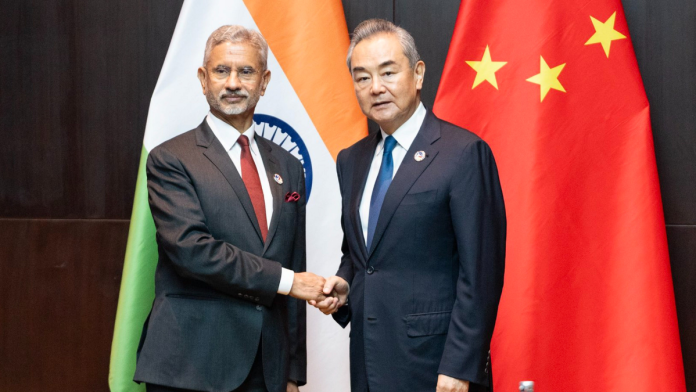India and China are working to repair their strained relationship five years after a deadly clash in Galwan. The recent visit of Chinese Foreign Minister Wang Yi to New Delhi is being seen as a key step in this direction.
At a meeting with India’s External Affairs Minister Dr. S. Jaishankar, Wang said the world was going through a “once-in-a-century transformation”. He warned that “unilateral bullying is rampant” and that free trade was under serious threat. The comment came at a time when India is facing a tariff offensive from the administration of US President Donald Trump.
Dr. Jaishankar said the talks provided a chance to review ties and move forward. He added that both countries had seen “a difficult period” but should now focus on cooperation. “Differences must not become disputes, nor competition conflict,” he said. The discussions, he noted, covered a wide range of topics, including border trade, pilgrimages, river data sharing, and economic issues.
Wang Yi also highlighted that India and China, as the world’s two largest developing countries, needed to show responsibility. He stressed that the two nations should work together, set an example for other developing countries, and support a more balanced and multipolar world order.
💰 Tokyo and London break records as China retreats in $9 trillion U.S. Treasury race
Economic and Strategic Concerns
India placed special focus on trade and technology-related issues during the talks. According to sources, China promised to address India’s concerns over fertilisers, rare earth elements, and tunnel boring machines. Rare earths are especially important as they are used in smartphones, green technologies, and advanced defense equipment. Since most of these are produced in China, access to them is seen as vital.
The discussions also touched upon border stability. Dr. Jaishankar said it was important to jointly maintain peace along the frontier. He pointed out that any forward movement in bilateral ties depended on progress in the de-escalation process at the border. On the second day of the visit, Wang Yi is scheduled to meet National Security Adviser Ajit Doval to discuss the issue further.
Both sides acknowledged the impact of the meeting between Prime Minister Narendra Modi and Chinese President Xi Jinping last year in Kazan. That summit was described as a “restart” of relations. Since then, exchanges at different levels have resumed, pilgrims from India have returned to Tibet, and border areas have seen relative calm.
China said both countries should strengthen confidence, expand cooperation, and avoid outside interference. It called for consolidating the momentum of improvement in ties and maintaining stability in the region.
💸 India’s GST overhaul aims to blunt impact of U.S. tariff squeeze
US Tariff Pressures Add to the Tensions
The thaw in relations between New Delhi and Beijing is taking place while India faces new economic challenges from Washington. The United States, under President Donald Trump, has imposed 50 percent tariffs on several Indian exports. The step is linked to India’s continued imports of Russian oil, which it says are necessary for the energy security of its 1.4 billion people.
Despite penalising India, Washington has not placed similar secondary sanctions on China for buying Russian oil. US Secretary of State Marco Rubio explained that most of the Russian oil imported by China is refined and then sold in the global market. If secondary sanctions were applied, it could cause disruptions and higher prices worldwide.
India’s oil trade with Russia, however, remains under sharp international attention. New Delhi has maintained that its purchases are based on market realities and the need to ensure affordable energy for its population.
Against this backdrop, the India-China talks take on added significance. The visit of Wang Yi is being seen as an attempt by both nations to fine-tune their ties and reduce dependence on Western markets amid ongoing global economic shifts.


